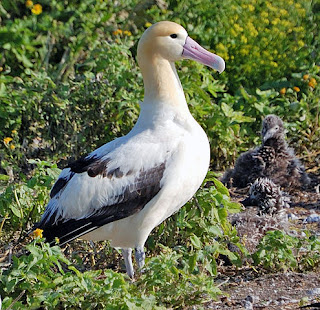Is your book an albatross?
Is your book an albatross?
(Republish of a post from my old blog.)
What is an albatross book? It’s a book you’ve been working on for a very long time but essentially is dead weight. It’s dragging you down, like the albatross hung around the neck of the Ancient Mariner. I lugged around two albatross books for years without even writing them. Only after I got rid of them could I start to actually write.
It’s usually the first novel. Or your Great Novel. Your magnum opus that will shake the literary world to its core – if you ever get around to writing it/submitting it/selling it. If you have actually written it and started submitting it, it’s getting rejected, but you keep on editing it and keep on trying because my god twenty years of blood, sweat and tears has gone into this thing!
Albatross identification guide
1. It’s HUGE.
The albatross book is rarely a slim volume. It’s an epic. If it’s epic fantasy then it really puts the EPIC into the genre name. Whatever, it’s way longer than books in that genre usually are. Why is it huge? Because over time it bloated as you put more and more in there. And because when you wrote it you didn’t have the skills to make it shorter. The size almost certainly damages the story, making it unfocused and episodic.
2. It follows the lead characters pretty much from birth to death.
This contributes to problem number one. Maybe you started out with that summer, that important summer the main character fell in love. But then you had this important stuff from his teenage years, and his childhood, and then “they lived happily ever after” isn’t enough! How exactly did they live happily? Etc.
3. You’ve been planning it for many many years and have never written it.
You’ve made notes. Oh hell have you made notes! You’ve got more words in notes than would ever be in the book. You have character profiles for everyone including the taxi driver who has one line in chapter 107. You’ve got drawings of the characters, in every different outfit they wear in the book. You know the backstory of all of them. You have maps, floor plans, designs for spaceships… You have so much stuff you have a wiki. You’ve invented a language. But you still haven’t written it.
4. It has a cast of thousands.
It’s a good job you have that wiki, because you have so many characters they need their own HR department. This story makes Endgame seem thinly populated.
5. You first thought of it when you were a kid.
This can be tricky. If you first came up with the idea when you were a teenager there’s a good chance that the story will always betray those origins. That at its heart it will lack the maturity and sophistication you’re capable of now.
So what do you do with this giant dead bird?
1. Dump it.
This is very hard. You’ve usually been working on it for a long time and you want to see some reward for that. But it may be that you’re best off cutting your losses, taking what you’ve learned from it and moving on.
2. Pick out just one part of it and make that the book.
It might be the very first part of it you thought of. The heart of the story. All that other stuff will help you understand the characters better, but it doesn’t have to be in the book. Find that core of the story that’s been lost under the hundred layers. Be ruthless with replanning or editing it.
3. Make it a series.
Maybe this is all good stuff, but there’s just too much of it. Maybe you do want to follow the character on the long journey of life. But if you cram it all in one book it loses focus, you don’t have a chance to milk each important part before you’re on to the next and the reader forgets about it by the end. Split it into a series! Or…
4. Make it into several unrelated books.
One of my albatrosses I reckon I could have turned into about half a dozen unrelated books. There were so many people and I had so much about their past before they all came together, that there was enough to sustain several novels even before the main action of the story started! With a first book you tend to want to cram everything in that you’ve ever thought of. Don’t. Save it for another book where it will have the chance to be in the limelight.
5. Strip it for parts.
Not quite the same as 3 and 4. You might not end up writing anything remotely like the original idea, but maybe there are scenes you just love, characters who still resonate. Use them! Write something entirely different, but use that scene or that character. Several characters and scenes from my albatross books have made it into other stories before and after I went pro. They can end up in entirely new places from where they started and of course I had to be ready to adapt them to make them fit. But I know where they were “born.”
So, take a look at that book that may be weighing you down and keeping you from moving on. Step back and eye it objectively. Maybe you need to get over yourself and admit that it could be fatally flawed and will never exist or sell in the form you originally envisaged. But there may still be something you can salvage from it



